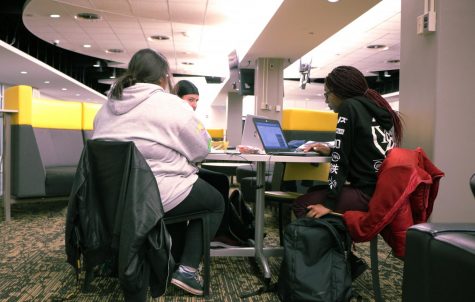PNW students may be among nation’s hardest working

PNW students squeeze all the time they can spare between busy class and work schedule to study and finish homework assignments.
PNW may have some of the hardest working college students in America.
The National Center for Education Statistics estimates that 43% of full-time students hold down a job. But at PNW, the number of employed students is much higher.
“Approximately 70% of PNW’s student body attends full-time while employed,” said Geoffrey Barrow, who has taught Spanish here since 1990.
And the workload may be heavier. NCES estimates that 10% of full-time college students worked 35 or more hours a week. Sociology professor Ralph Cherry believes the number of students working nearly full-time jobs is much higher at PNW.
“My sense is that a large majority of students are employed at least part time,” he said. “Many of these students likely work at least 30 hours a week. A much smaller percentage of students at Purdue West Lafayette work as many hours a week, or work at all.”
The workload poses significant challenges for students at PNW. They have less time for studies and the schedule may lead to burnout.
“Students often schedule classes around their work schedules,” said Cherry. “This pattern of scheduling is one reason students often take classes back-to-back-to-back. … Sounds efficient, except for the lack of opportunities between classes to ‘breathe,’ talk with a professor after a class or during office hours, prep for a class or print an assignment, or take advantage of opportunities to appreciate and attend unique campus activities.”
To qualify as a full-time student, the university requires at least four courses, 12 credit hours. For every hour of class, students should spend two hours outside of class, 24 hours a week in total.
Working students have less time to devote to learning.
Junior Thomas Duncan is a full-time PNW student and employed full-time as a service manager at Chipotle, working 35-40 hours per week. Duncan withdrew from PNW in the spring of 2016 and returned spring of 2019 to pursue a degree in communication.
Chipotle offers scholarships to employees who maintain a minimum GPA of at least 2.5 and work at least 20 hours a week. The program offers full reimbursement for select degrees or up to $5,250 annually after meeting the requirements.
To support himself, Duncan works more than 35 hours a week, which leaves little time for his education. Despite the obstacle, he copes.
“I schedule classes and work around each with little room for rest or relaxation,” he said. “There are times when I’ve stayed home just to get some sleep. Or I’ll skip class.”
Students must find ways to balance their work and school. Duncan says discipline is the key.
“I just have to stay disciplined and get work done or simply stay up most of the night to ensure I’ve finished my projects,” he said. “However, there are times when I’ll have to accept that I’m just tired and don’t really have time to rest for a while. However, planning ahead helps with these chaotic weeks.”






